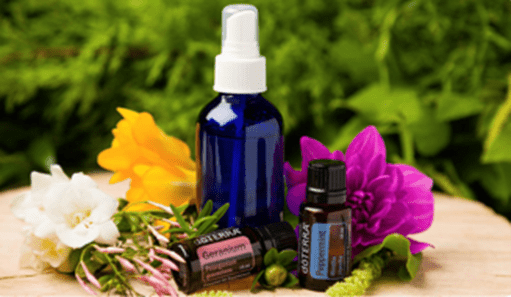Using Essential Oils for Restful Sleep
For many years, essential oils have been used to help calm and relax the body in an effort to promote a good night’s sleep. You may wonder ‘How does it work’? How do essential oils help the body with sleep? With any essential oil, the specific benefits of the oil will depend on its chemical makeup. Every essential oil has a completely unique chemical profile because each essential oil comes from a different plant part. Some chemical constituents can give an oil soothing or calming properties, while other constituents can make an oil cleansing, cooling, or invigorating. Because each essential oil contains a different combination of several chemical properties, each oil holds unique benefits. You simply need to select oils with chemical components that are soothing, calming, relaxing and promote a suitable environment for sleep.

What chemical components in essential oils contain properties that are useful for sleep?
Alcohols – ie has chemicals santanol and linalool, eg Clary Sage (linalool), Lavender (linalool), Sandalwood (santanol).
Ketones – ketones with calming properties have the chemicals carvone, camphor, frenchone and octanone, eg Dill (carvone), Lavender (frenchone)
Esters – eg Roman Chamomile (isobutyl acetate, isoamyl angelate), Clary Sage (linalyl acetate), Lavender (linalyl acetate), Bergamot (linalyl acetate).
How do chemical components make essential oils useful for sleep?
When inhaling an essential oil with calming properties, the brain will process the aroma, and an effect will follow. Once you experience a restful night’s sleep after using the calming oil, the brain will make what is called a positive association with that aroma, so the next time you smell that particular oil, your brain will have a similar reaction. After successfully using an essential oil to promote a good night’s sleep, that oil can be continually used as part of healthy sleep regimen because of the positive connection your brain has made between the smell of the oil and a good night’s rest.
Tailoring your essential oils to fit your sleeping needs:
When using essential oils to promote a good night of sleep, it’s best to choose oils with calming, soothing, or relaxing properties. The beauty of using essential oils to help with sleep is that there are many oils with calming properties to choose from. Two people can have a different reaction to the same oil, so you can experiment to see which oils work best for you and your sleeping preferences.
The essential oils below are some of the best oils to use to promote quality sleep because of their calming, soothing, relaxing, harmonizing, and grounding properties. You can also mix several oils together to create the optimal sleeping environment.
Sleep Support:
Oils that support restful feelings:
– Arborvitae
– Bergamot
– Cedarwood
– Cilantro
– Clary Sage
– Copaiba – try a drop on the base of your skull / back of your neck before sleep
– Frankincense
– Geranium
– Grounding Blend (Balance)
– Jasmine
– Juniper Berry
– Lavender
– Marjoram
– Melissa
– Neroli
– Orange
– Petitgrain
– Restful blend (Lavender Peace)
– Roman chamomile*
– Rose
– Sandalwood
– Siberian Fir
– Spikenard
– Vetiver
– Ylang Ylang
Bergamot: has a calming and soothing aroma.
Cedarwood: has a woody scent that promotes a peaceful feeling that can help the mind and body unwind.
Cilantro: scent creates a peaceful feeling.
Lavender: is commonly used for its calming properties
Ylang Ylang: has a rich floral aroma that can help reduce the effects of daily stress and promote a calm environment.
If Lavender isn’t your ‘go to’ then Citrus Oils may help try a combination of Roman Chamomile, Bergamot and Frankincense.
Vetiver is commonly known as the “switch off your brain” oil.
How to use essential oils to promote healthy sleep:
- Diffuse – simplest method, put up to 12 drops in a diffuser before going to bed
- Pillows and bedding – spritz your favourite calming essential oils over your pillows & bedding
- Heat pack or neck wrap – drop a few essential oils on to a heat pack to warm and relax you
- Bottoms of feet – helps to enjoy the aroma throughout the night – great for children (ensure diluted appropriately prior to application to children)
- Big toe – add to the bottom of your big toe and pad to the top of the toe (reflex point for brain)
- Warm shower – put a couple of drops of calming essential oil to the shower base (away from the path of water or you’ll lose it straight away); add some calming oils to your Conditioner and enjoy the aroma in bed
- Massage – use calming essential oils to massage your neck and temples – why not extend to your arms, back, legs and feet
- Cup of tea – put a drop of Roman Chamomile or Bergamot to your tea prior to going to bed (ensure the essential oil is food grade first)
Diffuser Blends for a Restul Night’s Sleep
2 drops Bergamot
2 drops Cedarwood
2 drops Copaiba
2 drops Vetiver
3 drops Lavender Peace
3 drops Marjoram
3 drops Sandalwood
3 drops Roman Chamomile
2 drops Geranium
2 drops Frankincense
3 drops Bergamot
3 drops Lavender
2 drops Lavender
2 drops Marjoram
2 drops Roman Chamomile
3 drops Juniper Berry
3 drop Lavender
3 drops Marjoram
4 drops Lavender
4 drops Cedarwood
4 drops Siberian Fir
3 drops Spikenard
2 drops Frankincense
2 drops Bergamot
2 drops Roman Chamomile
1 drop Vetiver
3 drops lavender
3 drops wild orange
2 drops Lavender
2 drops Roman Chamomile
3 drop Vetiver
3 drops Balance
2 drops Lavender
2 drops Roman Chamomile
Safety
While essential oils are generally safe, some oils are ‘hot’ and should always be diluted, eg wintergreen, oregano, cinnamon (we recommend diluting essential oils before use).
Before using, please check the safety aspect of each oil, eg not for use when pregnant, can irritate sensitive skin.
Most citrus oils are photosensitive and can cause skin irritation in the sun, so it’s best to stay out of the sun for up to 24 hours after applying citrus oils to exposed skin.
Application
Topical: apply to area of concern; back of neck, forehead or wrists; to affect the whole body – bottoms of feet, spine or navel; to affect specific organs or body system – apply to reflex points on the ears, hands or feet; add warm compress or massage to drive oils deeper into body tissues
Aromatic: put a couple of drops in your hands, cup them and breathe; diffuse (up to 12 drops in 100 ml diffuser); inhale directly from the bottle; spritz from bottle (combine essential oils with water, shake and spray); wear diffuser jewellery; spray some on your hair, scarf or other clothing (test first to ensure the essential oil doesn’t stain)
Resources
Books: Emotions & Essential Oils | Modern Essentials Handbook | The Essential Life | etc
Apps: Modern Essentials | doTERRA Daily Drop | Spoil Your Pet | Essential Emotions Reference
Ebook: https://media.doterra.com/us/en/flyers/essential-oils-and-sleep.pdf
Websites: www.sourcetoyou.com is where you’ll find all information on doTERRA’s growers, distillers, scientists, practitioners, and more
